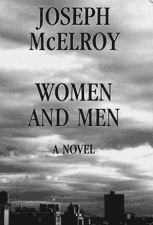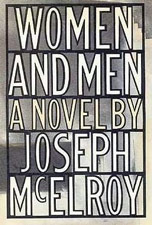


|
Women and Menby Joseph McElroy Edition History:
|
|
Beginning in childbirth and entered like a multiple dwelling in motion, the author’s longest and most ambitious narrative Women and Men embraces and anatomizes the 1970s in New York — from experiments in the chaotic relations between the sexes to the flux of the city itself. Yet through an intricate overlay of scenes, voices, fact, and myth, this fiction expanding on several tracks simultaneously parallel and intersecting, finds its way also across continents and into earlier and future times and indeed the Earth, the weather, at times almost measuring the immeasurable in fractal densities, to outline connections between the most disparate lives and systems of feeling and power. At its breathing core — literally in what are called "Breathers" that are so far from being respites along the margin that they become hugely central — this book plots the fuguelike and fieldlike densities of late-twentieth-century life. This global vision turns upon two people, James Mayn and Grace Kimball, apartment-house neighbors who never quite meet. Except, that is, in the population of others whose histories cross theirs — lovers, friends, and hermits; children, parents, grandparents; believers and skeptics; avatars and, apparently, angels. For Women and Men shows how the families through which we pass let one person’s experience belong to that of many, so that we throw light on each other as if these kinships were refracted lives so real as to be reincarnate. A mirror of manners, the book is also a meditation on the languages — rich, evolving, ludicrous, exact, and also American — in which we try to speak the world we’re in. Along the kindred axes of separation and intimacy Women and Men extends the great line of twentieth-century innovative fiction. |
|
Reviews for Women and Men |
|
|
Tom LeClair Washington Post Book World March 22 1987, ONCE IN a great while there is published a book that judges us, a book so rich in knowledge, imagination, and feeling -- in art -- that the reader is ravished and humbled, changed, made thankful. Joseph McElroy's mammoth Women and Men is that kind of book, the most important novel to appear in America since Thomas Pynchon's Gravity's Rainbow in 1973 If you have been daunted by Pynchon's ravaging encyclopedia of entropy or by some of its massive successors in the 1970s -- William Gaddis' JR, Robert Coover's The Public Burning, Don DeLillo's Ratner's Star, or John Barth's Letters -- you will find McElroy's novel rather different, even longer than these masterworks of the decade but as earnest as the Victorian triple-deckers of Thackeray and Dickens, as attentive to the moving particulars of American family life asJames or Faulkner. And unlike Pynchon and other contemporaries, McElroy is both fearful and hopeful about the survival of our species. |
|